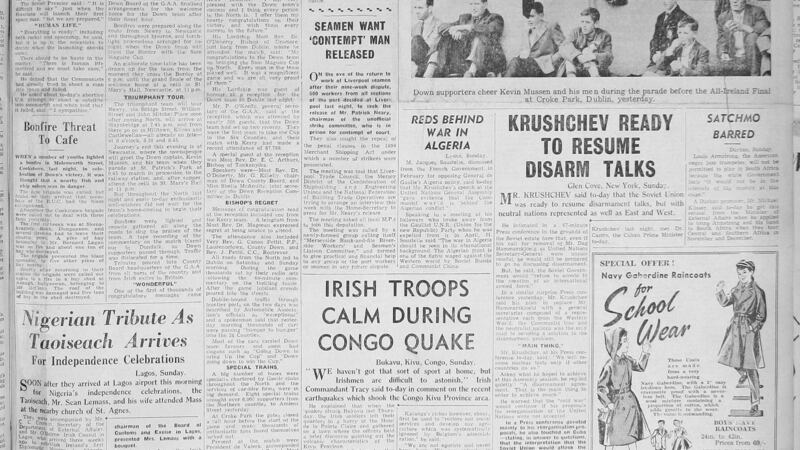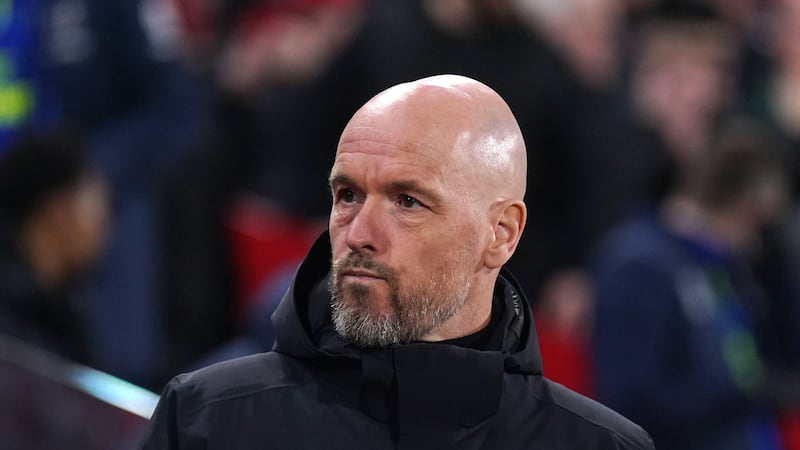A YEAR’S end is always a time when people think about what’s been most memorable over the previous 12 months.
Lists are drawn up of the best and the worst, in particular spheres and certainly in sport, in terms of matches, performances and players. Alphabets are contrived and compiled, to categorise and commentate on happenings. To be honest, though, it can be a struggle for me to recall some of the moments that fellow hacks are talking animatedly about.
Several years ago, I found an All-Ireland football finals programme from that season on my desk and commented that some of my colleagues must have kindly brought it for me (I’m quite fond of keeping a collection of programmes/hoarding them). Yet when I looked more closely at it, I saw my handwriting having marked down scorers in the games. It had only been a few months earlier, but I’d completely forgotten being at that massive occasion. For the record, it was from the Dublin-Kerry decider of 2011, so it wasn’t a boring match that might understandably have slipped out of remembrance.
I’m not, by any means, making light of memory loss. My mother called me the ‘Absent-minded professor’ when I was a child because I remembered so much from reading books but was extremely forgetful in daily life. I am no different now.
I worry about memory loss, having seen its effect on older family members, and with the awareness that it is becoming an increasing problem in our society. Apart from major events like a wedding or a birth of a child, I’m more likely to recall years because of what happened in sport, even if it might take time to sink in. Perhaps a personal connection makes matches more meaningful. I distinctly recall the year when one of my grandparents died because I received the call with the bad news as I sat in Clones shortly after a particular Armagh-Tyrone Ulster Championship clash.
Sport can bring back happier memories, though. This was made clear by an article in the latest issue (number 19) of the superb soccer/football quarterly The Blizzard, written by Spain-based Irish sportswriter Dermot Corrigan, detailing the work being done by the ‘Futbol v Alzheimer’ project. The Spanish soccer magazine Libero has worked with the Autonomous University of Barcelona to produce specific editions to help patients afflicted by Alzheimer’s disease.
These magazines, which mostly consist of photographs and short articles, each deal with a specific decade - the 1940s, '50s, '60s or '70s. Corrigan writes that the university’s research “found that talking about football helped stimulate the memory, attention and mood of people with Alzheimer’s and other forms of cognitive deterioration”.
Laura Coll, one of the authors of a study by the Barcelona university’s Health and Ageing Foundation, commented: “Alzheimer’s erases memories. It does not erase the passion for football, nor the emotions and that is what we want to recover using this therapy.”
Corrigan’s article got me thinking about how the GAA could do likewise here. The association does pull together impressively at times of trouble and there are plenty of projects at clubs to help with the general physical health of their community and/or involve older local residents/members. Perhaps some clubs already do admirable work such as that of the Spanish soccer project.
The GAA is a huge part of many people’s lives and that link goes on long after they stop playing, long after they might have stopped being able to go to games or to their clubs. The old photographs act as reminders, often of happier times. Whichever club or county you support, in whatever code, you will long remember their most famous achievements. Not just the years when they won big, but the goals, the points, even some passes and tackles.
Sporting successes, memorable matches and star players do stick in the mind; it’s just that, sometimes, a little help may be needed to bring them back to the forefront. Such projects as that ongoing in Spain cannot ‘cure’ memory deterioration, but they can spark recollections, inspire conversations between generations when, otherwise, the older relatives might struggle to say anything. One female patient in the Spanish project explained: “Things go out of our heads. But if we see them, we remember.”
Clubhouses may represent trips down memory lane of sorts, with photographs on the walls showing teams and players of the past. Yet, this approach could be rolled out to those who are perhaps housebound or in care homes or hospitals.
It would not be difficult for clubs and counties to compile collections of pictures which would help bring the past back to life. Counties in particular would be able to put together video and audio clips which could stimulate memories of past matches and players.
Already, there are magazines and Twitter feeds devoted to GAA nostalgia and they appear to be very popular, although perhaps these are not directed at the people who might benefit the most from them.
Showing old photographs of their team to a patient with Alzheimer’s is likely to prompt positive recollections, whether they were on that side themselves, or recall some of the players as neighbours or heroes to them.
Recently, I collated and organised some of the many GAA programmes I’ve acquired during my time in this newspaper, an exercise that reminded me of players and matches I’d completely forgotten about. There was much to remember in 2015, but there are many more years and seasons to recall. Prompting such recollection of our collective sporting past could be very beneficial for many.
MORE information can be found (and donations made) at http://futbolvsalzheimer.revistaLibero.com
Alzheimer’s Scotland has also set up a project at www.footballmemories.org.uk
For Dermot Corrigan’s article, see www.theblizzard.co.uk
Merry Christmas to all readers.








